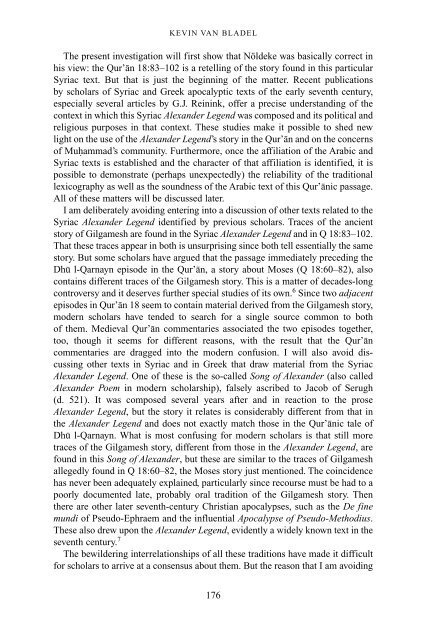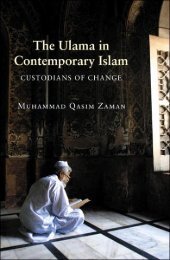The Qur'an in its historical context (pdf - Islam and Christian-Muslim ...
The Qur'an in its historical context (pdf - Islam and Christian-Muslim ...
The Qur'an in its historical context (pdf - Islam and Christian-Muslim ...
Create successful ePaper yourself
Turn your PDF publications into a flip-book with our unique Google optimized e-Paper software.
KEVIN VAN BLADEL<br />
<strong>The</strong> present <strong>in</strong>vestigation will first show that Nöldeke was basically correct <strong>in</strong><br />
his view: the Qur’an 18:83–102 is a retell<strong>in</strong>g of the story found <strong>in</strong> this particular<br />
Syriac text. But that is just the beg<strong>in</strong>n<strong>in</strong>g of the matter. Recent publications<br />
by scholars of Syriac <strong>and</strong> Greek apocalyptic texts of the early seventh century,<br />
especially several articles by G.J. Re<strong>in</strong><strong>in</strong>k, offer a precise underst<strong>and</strong><strong>in</strong>g of the<br />
<strong>context</strong> <strong>in</strong> which this Syriac Alex<strong>and</strong>er Legend was composed <strong>and</strong> <strong>its</strong> political <strong>and</strong><br />
religious purposes <strong>in</strong> that <strong>context</strong>. <strong>The</strong>se studies make it possible to shed new<br />
light on the use of the Alex<strong>and</strong>er Legend’s story <strong>in</strong> the Qur’an <strong>and</strong> on the concerns<br />
of Muhammad’s community. Furthermore, once the affiliation of the Arabic <strong>and</strong><br />
Syriac texts is established <strong>and</strong> the character of that affiliation is identified, it is<br />
possible to demonstrate (perhaps unexpectedly) the reliability of the traditional<br />
lexicography as well as the soundness of the Arabic text of this Qur’anic passage.<br />
All of these matters will be discussed later.<br />
I am deliberately avoid<strong>in</strong>g enter<strong>in</strong>g <strong>in</strong>to a discussion of other texts related to the<br />
Syriac Alex<strong>and</strong>er Legend identified by previous scholars. Traces of the ancient<br />
story of Gilgamesh are found <strong>in</strong> the Syriac Alex<strong>and</strong>er Legend <strong>and</strong> <strong>in</strong> Q 18:83–102.<br />
That these traces appear <strong>in</strong> both is unsurpris<strong>in</strong>g s<strong>in</strong>ce both tell essentially the same<br />
story. But some scholars have argued that the passage immediately preced<strong>in</strong>g the<br />
Dhu l-Qarnayn episode <strong>in</strong> the Qur’an, a story about Moses (Q 18:60–82), also<br />
conta<strong>in</strong>s different traces of the Gilgamesh story. This is a matter of decades-long<br />
controversy <strong>and</strong> it deserves further special studies of <strong>its</strong> own. 6 S<strong>in</strong>ce two adjacent<br />
episodes <strong>in</strong> Qur’an 18 seem to conta<strong>in</strong> material derived from the Gilgamesh story,<br />
modern scholars have tended to search for a s<strong>in</strong>gle source common to both<br />
of them. Medieval Qur’an commentaries associated the two episodes together,<br />
too, though it seems for different reasons, with the result that the Qur’an<br />
commentaries are dragged <strong>in</strong>to the modern confusion. I will also avoid discuss<strong>in</strong>g<br />
other texts <strong>in</strong> Syriac <strong>and</strong> <strong>in</strong> Greek that draw material from the Syriac<br />
Alex<strong>and</strong>er Legend. One of these is the so-called Song of Alex<strong>and</strong>er (also called<br />
Alex<strong>and</strong>er Poem <strong>in</strong> modern scholarship), falsely ascribed to Jacob of Serugh<br />
(d. 521). It was composed several years after <strong>and</strong> <strong>in</strong> reaction to the prose<br />
Alex<strong>and</strong>er Legend, but the story it relates is considerably different from that <strong>in</strong><br />
the Alex<strong>and</strong>er Legend <strong>and</strong> does not exactly match those <strong>in</strong> the Qur’anic tale of<br />
Dhu l-Qarnayn. What is most confus<strong>in</strong>g for modern scholars is that still more<br />
traces of the Gilgamesh story, different from those <strong>in</strong> the Alex<strong>and</strong>er Legend, are<br />
found <strong>in</strong> this Song of Alex<strong>and</strong>er, but these are similar to the traces of Gilgamesh<br />
allegedly found <strong>in</strong> Q 18:60–82, the Moses story just mentioned. <strong>The</strong> co<strong>in</strong>cidence<br />
has never been adequately expla<strong>in</strong>ed, particularly s<strong>in</strong>ce recourse must be had to a<br />
poorly documented late, probably oral tradition of the Gilgamesh story. <strong>The</strong>n<br />
there are other later seventh-century <strong>Christian</strong> apocalypses, such as the De f<strong>in</strong>e<br />
mundi of Pseudo-Ephraem <strong>and</strong> the <strong>in</strong>fluential Apocalypse of Pseudo-Methodius.<br />
<strong>The</strong>se also drew upon the Alex<strong>and</strong>er Legend, evidently a widely known text <strong>in</strong> the<br />
seventh century. 7<br />
<strong>The</strong> bewilder<strong>in</strong>g <strong>in</strong>terrelationships of all these traditions have made it difficult<br />
for scholars to arrive at a consensus about them. But the reason that I am avoid<strong>in</strong>g<br />
176



